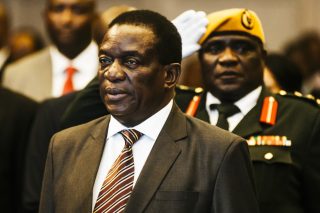After two decades of economic sanctions by the United States and its allies, Zimbabwe forges to strengthen bilateral relations with Russia and its allies. Since Russian began its onslaught on Ukraine in 2022, Zimbabwe has not condemned the act. Rather, it looks to Moscow for fuel, cooking oil and wheat which it once imported from Ukraine. In turn, Russia would have access to Zimbabwe’s minerals. Both countries have a long history of bilateral relations dating back to the Soviet Union days.
“Zimbabwe is not necessarily an ally of Russia and its allies. There is a historical relationship between Zimbabwe and Russia. Its historical ties date back to the Soviet Union days, under the leadership of the ruling ZANU-PF, one the liberation parties in Africa that fought colonialism and apartheid,” said Ovigwe Eguegu, Policy and Security Analyst at Development Reimagined. “Despite the sanctions, Zimbabwe still has the right to explore relationships with outer countries for national development. For instance, Zimbabwe has introduced many initiatives for economic growth. It recently ban lithium export to local refining within its borders thereby attracting investment into the country which China could explore.”
China, an important ally of Russia, has played a critical role in the development of Zimbabwe’s economy, across key sectors such as mining and agriculture. In September 2022, Zimbabwe’s government approved a proposal by a group of Chinese investors to establish a $2.83 billion battery-metals park that will process metals including lithium, platinum and nickel. The following month, China’s Tsingshan Holding Group moved to fund the construction of a steel factory with an annual output expected to reach 600,000 tons.
Last November, the Chinese government gifted Zimbabwe, a six-storey parliament building worth about $200 million in Mt. Hampden, about 18 kilometres away from Harare, the country’s capital city. China’s direct investment stock in Zimbabwe reached above $2 billion, making it the country’s topmost foreign investor. The Asian country has disregarded economic sanctions from the West to boost trade activities within the African country.
“At the moment, we are in the middle of a great power competition between the US, Russia, China and other western countries. There’s going to be a lot of political calculations and initiatives taken by all countries targeting African countries.” – Ovigwe Eguegu, Policy and Security Analyst at Development Reimagined.
Zimbabwe came under the US, EU, UK and Australian economic sanctions in 2002, during the time of its ruling dictator, President Robert Mugabe. His government was sanctioned for undermining democracy and violating human rights in Zimbabwe. Those sanctions eventually shut it out from the world, cutting it off from receiving international financing and thereby impoverishing its people. But last year, Russia pledged to improve its trade relations with the African country despite economic sanctions from the West.
“Essentially, Zimbabwe has turned to major alternative powers because of economic sanctions. It has a robust economic relationship with China. With Russia, it is not as robust. It is more geared towards politics and security. Whether Zimbabwe would be able to manage these relationships will now be dependent on its statecraft and also whether the US is going to put more pressure on Zimbabwe to impact its foreign policy or lessen its sanctions to stir it away from Russia and China,” Ovigwe said.
Because Zimbabwe has considerably functioned economically without the west, it may not see the need to change its foreign policy for short-term gains. It has been able to get investments into industrialisation projects from China, political and security investments from Russian and most recently, agricultural projects from Belarus. “At the moment, we are in the middle of a great power competition between the US, Russia, China and other western countries. There’s going to be a lot of political calculations and initiatives taken by all countries targeting African countries,” he added.
On Monday, January 30, President Alexander Lukashenko of Belarus arrived in Zimbabwe to discuss bilateral relations with President Emmerson Mnangagwa. The talks were aimed to strengthen existing excellent relations in areas such as politics, mining and agriculture. According to reports, Zimbabwe finally received its $58 million farm mechanisation facility from Belarus after years of negotiation, while another deal worth $100 million was signed. Ultimately, Lukashenko delivered Belarusian farming facilities such as agricultural vehicles, tractors and equipment during his visit.
“First of all, I want to thank the Americans and the entire Western world for having imposed sanctions against us. Otherwise, American and German tractors would have come instead of Belarusian ones to this huge field,” said Lukashenko, who is also under US and Australian economic sanction regimes. He is the first and only president of Belarus since 1994.








